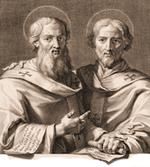Make your gift today!
Help keep Catholics around the world educated and informed.
Already donated? Log in to stop seeing these donation pop-ups.
Fathers of the Church
Letter CXXXVI. to Cyrus Magistrianus
by Theodoret in 450? | translated by Blomfield Jackson
I was very much distressed to hear of the trouble which had befallen you. How indeed could I fail to suffer, making as I do your interest mine, and remembering the apostolic law which bids us not only "rejoice with them that do rejoice, but also weep with them that weep"? Suffering itself is able to draw even those that are at enmity with one another into sympathy.
What is so grievous as to lose a wife; one who bore blamelessly the yoke of wedlock, one who made her husband's life pleasant, one who shared the care of the family; one who managed the household and shared in the direction of everything; one who was ready to suggest whatever might be likely to be of service, and to comply with the wishes of her husband? But what sorrow could surpass the committal to the tomb of the mother at the same moment as the son whom she bore; a son who had been carefully trained and had received a learned education; one who, you hoped, would be the stay of your old age; buried in the very spring of his manhood, when the down was just beginning to grow upon his cheeks? Did we only look at the character of the calamity, it admits of no consolation. But when we bethink us how our race is doomed to die; that against that race the divine fiat has gone forth; that suffering is common, for life is full of such woes; we shall bravely bear what has happened, shall repel the assaults of despair, and shall raise that wonderful song of praise "The Lord gave and the Lord hath taken away; the Lord hath done what seemed to him good; blessed be the name of the Lord." But we have many more reasons for consolation. We have been distinctly taught the hopes of the resurrection, and we look for the time when the dead shall live again. We know how the Lord many times called death sleep. If we trust, as in truth we do, the Saviour's words we are bound not to mourn those that have fallen asleep, even though their sleep lasts somewhat longer than it is wont. We must await the resurrection. We must remember that the Ruler of the world in His wisdom, and clearly knowing as He does not the present only but the future also, guides events for our good. A wise man who knew all this full well reasons about deaths of this kind and says, "Yea; speedily was he taken away, lest that wickedness should alter his understanding."
Let us submit I beg you to the wise Ruler of all; let us submit to His decrees. Whether they be pleasant or whether they be grievous, they are good and profitable, they make men wise; for them that endure they ordain crowns.
Taken from "The Early Church Fathers and Other Works" originally published by Wm. B. Eerdmans Pub. Co. in English in Edinburgh, Scotland, beginning in 1867. (NPNF II/III, Schaff and Wace). The digital version is by The Electronic Bible Society, P.O. Box 701356, Dallas, TX 75370, 214-407-WORD.






